Course Brief
Unit Abstract
Electrical machines can be found in manufacturing, transport, consumer appliances and hospitals. People will come across them every day in their home and at work. They convert energy in three ways: transformers which change the voltage level of an alternating
current; motors which convert electrical energy to mechanical energy; and generators which convert mechanical energy to electrical energy. Transducers and actuators are also energy converters, and can be found in a wide range of industrial and domestic applications.
This unit introduces students to the characteristics and operational parameters of a range of electromagnetic powered machines that are used in a variety of applications. Among the topics included in this unit are: principles underlying the operation and construction of transformers, induction motors, synchronous machines, electromagnetic transducers, actuators, and generators; and operating characteristics of electrical machines such as voltage, current, speed of operation, power rating, electromagnetic interference (EMI) and
efficiency.
On successful completion of this unit students will be able to identify the constructional features and applications of transformers; investigate the starting methods and applications of three-phase induction motors and synchronous machines; investigate the types of generator available in the industry by assessing their practical application; and analyse the operating characteristics of electromagnetic transducers and actuators.
- This course is offered in 45 hours.
-
BTEC Higher National Diploma (HND) in Engineering (Electrical and Electronic Engineering)
The Pearson BTEC Higher National Diploma (HND) in Engineering (Electrical and Electronic Engineering) will develop students into highly trained, competent professionals, who are able to meet the demands of employers in the various engineering sectors.
This qualification also serves as the next step for students completing the SBCS Diploma in Electrical and Mechanical Engineering Technology programme and are interested in pursuing the BEng (Hons) in Electrical and Electronic Engineering (Technology).
Why choose the HND in Engineering (Electrical and Electronic Engineering)?
- Recognition: This is an Internationally recognized qualification, recognized in more than 70 countries worldwide.
- Final Year Entry: Graduates of this programme gain direct access to the final year of the University of Greenwich's B.Eng. in Electrical and Electronic Engineering (Technology) programme offered at SBCS, Champs Fleurs campus.
- Career-focused: The curriculum was developed to meet the needs of the current marketplace after consultation with employers, students, and professional bodies.
- Practical hands-on training: Emphasis is placed on practical training and the application of the knowledge taught.
Why study Electrical and Electronic Engineering at SBCS?
- Instructors are certified, highly skilled and experienced practitioners who bring their knowledge and work experience to the classroom.
- Modern, fully equipped labs. You learn using the same equipment you will encounter in the field.
- Convenient class schedules. Work, Earn and Study at the same time. Classes are offered on a part-time basis, which allows working individuals to balance their work and educational needs.
Electrical and Electronic Engineering promo video

Our Labs
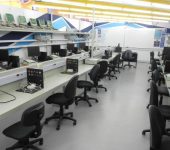
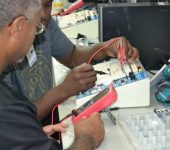
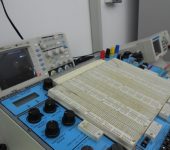
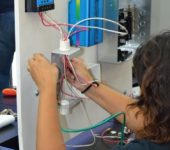
Our Campus



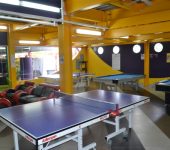
Schedule & Fees
The next intake for this offering will be in January 2025.
For more details on fees and courses Download the Programme Brief
FEE AMOUNT NOTE SBCS Registration Fee TT$850 each semester
Payable upon registration every semester (for 6 semesters) Tuition Fee TT$2,200 (per 15 credit module)
TT$4,400 (per 30 credit module)
Total Tuition Fee over 2 years: TT$35,200 BTEC Registration and Annual Fees £550
Payable by: February, 2025
Please note: All information provided is subject to change without prior notice.
What's Next?